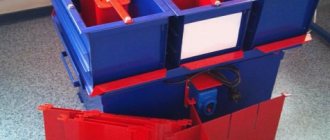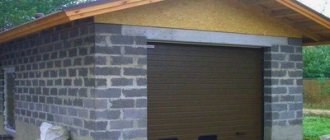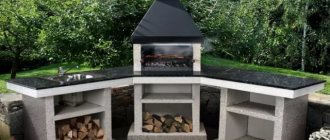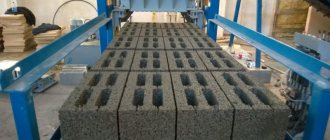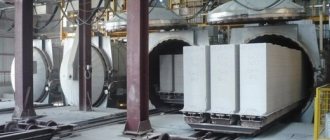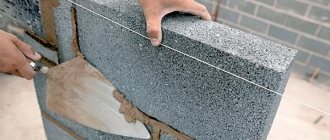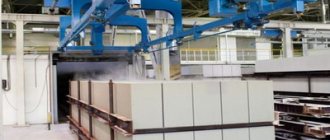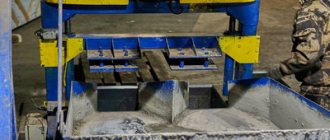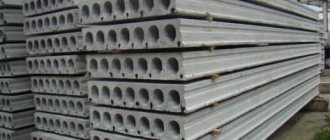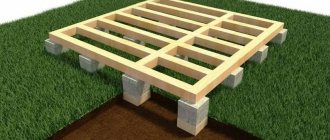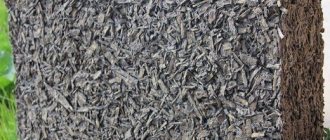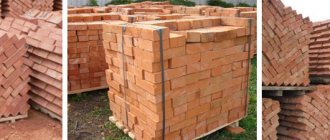Expanded clay concrete blocks are a building material that has many advantages. These include:
- excellent heat and sound insulation properties,
- frost resistance,
- durability,
- light weight,
- low cost, and others.
Wall elements made of expanded clay concrete block
Therefore, setting up a mini-factory for their production is considered a very profitable business idea.
Business Features
A mini-plant of this type is quite profitable, since there is a shortage of quality products in the building materials market. Large enterprises are trying to reduce the cost of expanded clay concrete blocks, and do this at the expense of quality deterioration. Therefore, if you set up a production line of small capacity, you can get high profits soon enough.
Machine for the production of expanded clay blocks
Small construction stores are considered the main distribution channels for finished products. To increase demand, it is recommended to establish the production of several types of expanded clay blocks of different brands and sizes.
Necessary raw materials
To produce this building material, you must use the following raw materials:
- Portland cement;
- fine expanded clay (up to 10 mm);
- expanded clay sand;
- water.
Calculation of material costs for the production of expanded clay concrete blocks
The characteristics of expanded clay concrete blocks depend on the proportions of these ingredients. If you use a lot of cement, you can get a structural material. It is used for laying load-bearing structures because it has high strength and rigidity.
To obtain a product with high thermal insulation properties, it is necessary to apply the following proportion:
- 60% expanded clay;
- 30% sand;
- 10% cement.
Proportions of expanded clay concrete
Profitability
Machines for the production of expanded clay concrete blocks are quite compact in size, so there is no need to rent a large room. It is quite common to make such blocks in a garage or in a country house. The main conditions are the availability of running water and electricity.
With standard block parameters (39*19*19 cm), 1 m3 includes 71 units. For a conditional calculation of production costs, solid concrete of grade M 90 kg/cm2 is taken, hollow concrete - M 30 kg/cm2 and density 950 kg/cm2.
| Material consumption per 1 block, kg | Price 1 ton (m3), rub. | |
| Cement | 3,08 | 2500 |
| Sand | 5,46 | 200 |
| Expanded clay | 4,62 | 1117 |
| Water | 1,3 | 30 |
| Cost of materials per 1 block, rub. | |
| Total | 14,23 |
| Cement | 7,7 |
| Sand | 1,09 |
| Expanded clay | 5,4 |
| Water | 0,04 |
The blocks have a fairly high profitability due to their low cost. At the same time, the average price of one unit is 25 rubles and for 1 m2 - no more than 1800 rubles.
Knowing the cost and profitability of producing expanded clay concrete blocks, let’s try to make them ourselves, calculating the proportions correctly.
Production technology
To produce these blocks, you must adhere to the following technology:
- In a concrete mixer, all components are mixed in a certain proportion. First, the required volume of water is poured into it, then expanded clay, sand and cement are poured in. A plasticizer must also be added. The end result is a dense mixture that can hold its shape well.
Scheme for the production of expanded clay concrete blocks - The freshly prepared solution must be transferred into molds. After this, the blocks are formed on a special vibrating machine. During operation of this equipment, it is necessary to periodically remove excess solution that is formed as a result of compaction of the mixture.
- At a temperature of 50-60°C, the products are dried using special equipment for 2 days.
- After the blocks have hardened, it is necessary to keep them in the molds in the open air for another 1-2 weeks so that they achieve the required performance characteristics.
Expanded clay block production technology
The production of expanded clay blocks consists of the following stages:
- Preparation of the working mixture.
- Molding of products.
- Pre-hardening.
- Drying of products and strengthening.
- Transportation of expanded clay concrete blocks to the warehouse.
Preparation of the solution
To prepare 100 kg of working mixture, take the following proportions, kg:
Expanded clay - 54.5.
Sand – 27.2.
Cement – 9.21.
Water – 9.09.
Cement grades M400 or M500 are used in dry and pure form. To obtain a glossy surface, tile adhesive is added to the mixture. The plasticity and workability of the solution is increased with the help of plasticizers.
Chemical additives increase the frost resistance and water resistance of finished products. To increase porosity, wood saponified resin is used.
Concrete mortar is prepared by thoroughly mixing the mixture components. A weighed amount of ingredients is placed in a concrete mixer or special container. The composition is stirred for 2-3 minutes.
From the finished portion of the mixture, 9-10 standard blocks measuring 39x19x19 cm are obtained.
Product molding
The prepared composition is placed in special steel molds. After each use, the molds are rinsed with clean water and wiped with a dry cloth.
The molds with the mixture are installed on a vibration stand. Under the influence of vibration, the mixture in the molds is compacted. As sedimentation and compaction proceed, the required amount of solution is added. Excess concrete is promptly removed.
After sufficient compaction, the finished products are placed in the drying chamber.
Drying and storage
Drying is carried out at a temperature of 50-60°C for 2 days. After the specified period, the products are dried for 25-26 days in an open warehouse under natural conditions. The dried products are sent to the finished product warehouse for subsequent sale.
Equipment for the production of
A mini-plant of this type must be equipped with several medium-power units, which form an entire production complex. The list of necessary equipment includes:
- concrete mixer. This unit must have a capacious drum of 125 liters with powerful blades. Popular models of concrete mixers are SGS-M245 (98 thousand rubles), KVADR BP2G-375 (12 thousand dollars), KVADR BP1V-375 (460 thousand rubles);
The production process of expanded clay concrete blocks - vibrating table This unit is equipped with interchangeable molds and a machine for the production of various types of products. This type of equipment is cheaper, but more difficult to operate. If the machine is equipped with non-removable forms, all technological operations will be as automated as possible. You can also use a vibropress. These units are more powerful, so with their help you can get more finished products. Popular models are vibrating table EV-346 (35.4 thousand rubles), Hephaestus-6 plus (38.4 thousand rubles), vibration press KVADR 1CO2 (4.5 thousand dollars);
- molding trays. To fully equip the production, it is necessary to purchase a whole set, the cost of which is 50 thousand rubles.
Necessary equipment
To produce expanded clay concrete blocks, you must have certain equipment (vibropress, machine, installation, molds, etc.).
Vibropress
Vibrating tables are a budget option, but the quality of the products will be much lower than that of more expensive equipment. RMU vibrating machines are in great demand.
Compact dimensions and low weight make it possible to transport them in a passenger car. The power, as a rule, does not exceed 200 W, and power is supplied using a standard single-phase socket. Depending on the configuration, the cost of models can vary between 13-20 thousand rubles.
Now let's talk about the name and prices of machines for the production (for production) of expanded clay concrete blocks with our own hands and in production.
Machine
The range includes a large number of machines designed for the production of expanded clay concrete. The choice should be made based on the purpose of the acquisition (self-construction of buildings, houses, or opening a business).
Advantages of purchasing:
- Availability of a package of documentation, which contains not only instructions for using the machine, but also features of the technological process.
- The purchase of a machine guarantees full consultation with a specialist, as well as further technical support.
- You can make a special order, which will allow you to purchase a more functional and improved machine.
Important! The average load of the machine allows you to recoup its cost in just one year.
The installation for the production of expanded clay concrete blocks "Gefest-1" has compact dimensions that allow it to be moved by one person (weight about 20 kg). Moreover, in a standard working day (8 hours) it is capable of producing 150-160 KB of blocks. Its average cost is 8-10 thousand rubles.
This video talks about making expanded clay concrete blocks with your own hands using equipment such as a vibrating machine:
Forms
They can be purchased ready-made (the cost of the set is 50 thousand rubles). You can also make molds for making expanded clay concrete blocks with your own hands. Ready-made products can produce the following types of blocks:
- Blocks without voids;
- With through voids;
- With blind voids.
When making molds yourself, you will need wooden boards about 2 cm thick. The structure itself is made on the basis of a pallet and two L-shaped elements. After assembly you should have 4 standard sides.
Ready-made lines for organizing production
To make a big profit, you need to purchase powerful equipment. It costs much more, but its performance is several times higher. With the help of such machine lines, you can recoup the initial costs in 1-2 months.
Heat transfer of expanded clay concrete and heat block
Rifey 04TS
Equipment characteristics:
- cost – 9.25 thousand dollars;
- productivity – 150 pieces/hour;
- power – 15 kW;
- the weight of the entire complex is 2.7 tons.
Layout of the Rifey-04 press
For efficient production you will need 3-4 people. The complex includes a variety of equipment, including a control panel to automate the process.
Rifey-Buran-M
Machine characteristics:
- cost – 50 thousand dollars;
- productivity – 500 pieces/hour;
- power – 41 kW;
- unit weight – 12.5 tons;
- additional functions - production of paving slabs (56 sq. m/hour), facing stones (3000 pieces/hour) and other products.
Rifey-Buran brick making machine
To organize the production process you will need service personnel - 3-5 people. The advantages of the unit are the automation of dosing of mixtures, the presence of memory for different recipes (up to 24), minimal errors when weighing (no more than 2%).
Business plan
A small-capacity mini-plant requires the following minimum initial investments (in rubles):
- purchase of equipment – 400,000;
- transportation of the production complex and raw materials – 40,000;
- purchase of raw materials – 100,000;
- organizational expenses – 50,000.
As a result, it turns out that to open a small plant for the production of expanded clay concrete blocks you will need about 530 thousand rubles.
Characteristics of expanded clay concrete blocks
This equipment is capable of producing 110 pieces of finished products per hour. With a workload of 22 days a month for 6 hours, you can get no more than 14,520 pieces. The wholesale price of one block is 36 rubles. With such indicators, the amount of income reaches 522,720 rubles per month.
Types of expanded clay blocks
The cost of production is formed based on the following needs (in rubles for a batch of 110 pieces):
- expanded clay – 726 kg – 1452;
- sand – 266.2 kg – 79.9;
- cement – 121 kg – 435.6;
- water – 96.8 l – 4.8;
- electricity – 1.9 kW/hour – 6.5.
Business plan for the production of expanded clay concrete blocks
As a result, the cost of 1 block will be 17.99 rubles. To produce 14,520 pieces, you will need 261,215 rubles. The following operating expenses are also present (in rubles):
- workers' salary - 60,000;
- social contributions – 18,000;
- rental of industrial premises – 50,000;
- administrative expenses (Internet, mobile communications, banking services, utility bills, etc.) – 20,000;
- unaccounted expenses - 15,000.
As a result, the net profit for the month will be about 98.5 thousand rubles. With such power, the mini-plant will pay for itself within 6 months. When using more efficient equipment, this figure can be reduced to 1-2 months.
